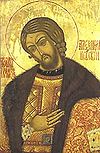- Nikolay Novikov
-
Nikolay Ivanovich Novikov (Russian: Никола́й Ива́нович Новико́в) (8 May [O.S. 27 April] 1744 - 12 August [O.S. 31 July] 1818) was a Russian writer and philanthropist most representative of his country's Enlightenment. Frequently considered to be the first Russian journalist, he aimed at advancing the cultural and educational level of the Russian public.
Together with Johann Georg Schwartz, Ivan Vladimirovich Lopukhin, and Semion Ivanovich Gamaleya he brought martinism and rosicrucianism to Russia.[1]
Novikov belonged to the first generation of Russians that benefited from the creation of the Moscow University in 1755. He took an active part in the Legislative Assembly of 1767, which sought to produce a new code of laws. Inspired by this kind of freethinking activity, he took over editing the Moscow Gazette and launched satirical journals, patterned after The Tatler and The Spectator. His attacks on the existing social customs prompted jocund retorts from Catherine the Great, who even set her own journal called Vsyakaya vsyachina to comment on Novikov's articles.
By the 1780s, Novikov rose to the highest positions in Russian Freemasonry, which liberally funded his ambitious book-publishing ventures. Novikov's press produced a third part of contemporary Russian books and several newspapers. Novikov used his influence for various noble purposes, such as a large-scale project of promoting Shakespeare to Russian public.
When the French Revolution started, Catherine changed her attitude towards the likes of Novikov. His printing-house was confiscated. Three years later, without a formal trial, he was incarcerated in the Shlisselburg Fortress for 15 years. Much of his printed material was pulped, including 1,000 copies of Edward Young's The Last Day (1713). Emperor Paul set Novikov free, but the latter was too scared and broken-hearted to resume his journalistic activities.
References
- ^ Raffaella Faggionato A Rosicrucian Utopia in Eighteenth-Century Russia Springer, the Netherlands 1997
Figures in the Age of Enlightenment by country or region Notable figures America (English) America (Latin) England Edward Gibbon · Thomas Hobbes · Samuel Johnson · Edmund Burke (Irish born) · John Locke · Isaac Newton · Robert WalpoleFrance Germany Greece Hungary Italy Low Countries Poland-Lithuania Portugal Romanian States Russia Mikhail Lomonosov · Ivan Shuvalov · Ivan Betskoy · Ekaterina Dashkova · Nikolay Novikov · Mikhail Shcherbatov · Alexander RadishchevScandinavia Scotland Serbia Spain Ukraine Related topics People from Russia Leaders and religious - Pre-1168
- 1168–1917
- 1922–1991
- 1991–present
- RSFSR leaders
- General secretaries
- Soviet premiers (1st deputies)
- Soviet heads of state (and their spouses)
- Prime ministers (1st deputies)
- Foreign ministers
- Prosecutors general
- Metropolitans and patriarchs
- Saints

Military and explorers - Field marshals
- Soviet marshals
- Admirals
- Aviators
- Cosmonauts
Scientists and inventors - Aerospace engineers
- Astronomers and astrophysicists
- Biologists
- Chemists
- Earth scientists
- Electrical engineers
- IT developers
- Linguists and philologists
- Mathematicians
- Naval engineers
- Physicians and psychologists
- Physicists
- Weaponry makers
Artists and writers Sportspeople - Chess players
Categories:- 1744 births
- 1818 deaths
- People from Moscow Oblast
- Russian journalists
- Russian philanthropists
- Age of Enlightenment
- Martinism
- Moscow State University alumni
- Russian magazine founders
Wikimedia Foundation. 2010.

